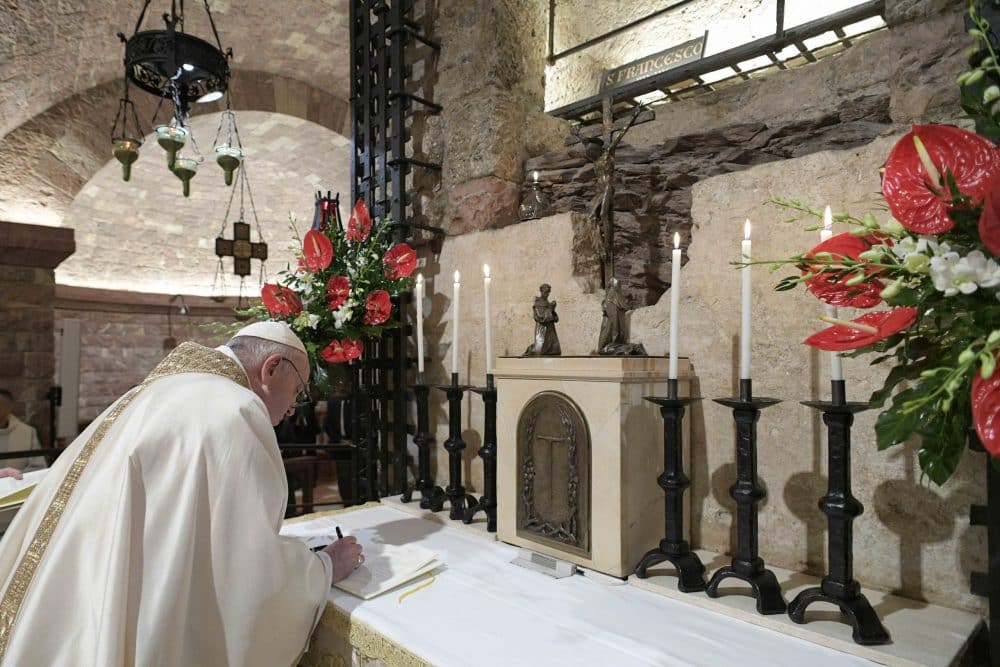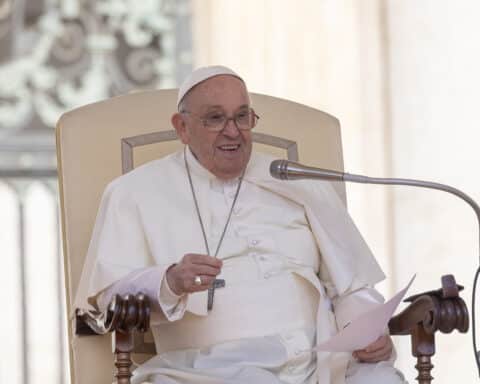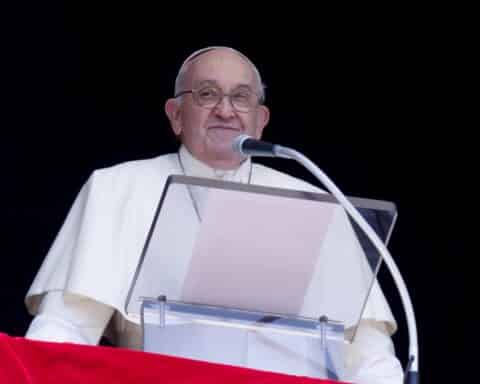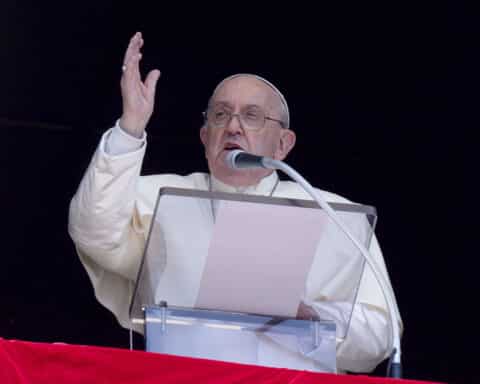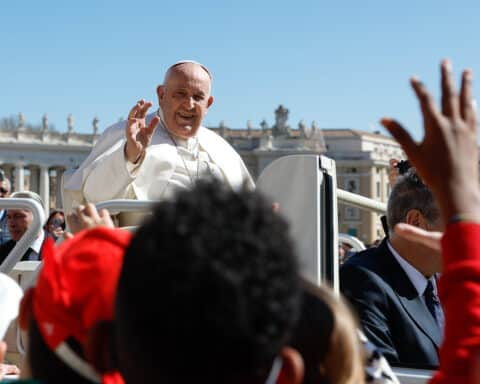If Laudato Si’, Pope Francis’ second encyclical, released in 2015, was a papal plea to care for our common home, then Fratelli Tutti (unofficially translated “Brothers All”), his third encyclical, released Sunday, could be called a papal plea to care for our fellow man.
Similarly inspired in part by St. Francis of Assisi — this latest document was released on his feast day — the letters could be brothers themselves, as both express a desire and issue a call for greater connectivity and concern for the world and those who inhabit it.
Though encyclical letters traditionally are written by the pope to the bishops of the world, Pope Francis said he sought to make Fratelli Tutti “an invitation to dialogue among all people of good will,” while written from a Christian perspective. Laudato Si’, which focused on care for creation, was addressed to “every person living on this planet.”
Also of note: With Laudato Si’, Pope Francis was inspired by Orthodox Patriarch Bartholomew’s passionate pleas to care for creation. Fratelli Tutti was inspired, Francis said, by his February 2019 meeting with Grand Imam Ahmad Al-Tayyeb in Abu Dhabi, in which they co-signed a historic document of fraternity that stated that “God has created all human beings equal in rights, duties and dignity, and has called them to live together as brothers and sisters.”
“This,” Pope Francis writes, “was no mere diplomatic gesture, but a reflection born of dialogue and common commitment.” Fratelli Tutti seeks to expand on some of the themes of the document, while offering a “new vision of fraternity and social friendship” that the Holy Father hopes will move beyond words and into action.
Familiar themes
The new encyclical reads like quintessential Pope Francis, encouraging a universal brotherhood that can’t help but feel at least a bit utopian, especially at this time in history. He envisions a global society in which individuals and nations place care and concern for one another over care and concern for themselves — at the root of which is a fundamental acknowledgement of the dignity of each human person. Fratelli Tutti is a consideration of love in a social context: one that is open to all, that doesn’t count the cost, that isn’t combative, that values all, and that ultimately leads to peace.
But despite the loftiness of such aspirations, Francis insists that universal brotherhood is not an impossibility. It does, however, demand “a decisive commitment to devising effective means to this end” (No. 180). This commitment and method is what Francis attempts to inspire in Fratelli Tutti.
The Holy Father begins by identifying trends in the world that may block this goal of universal fraternity. He cites isolationism, nationalism, a global economy that “promotes individual interests,” a “loss of the sense of history,” limitless consumption, wastefulness, a throwaway culture and the lack of concern for the environment. Francis rejects all that is divisive, including racism (quoting, in part, the U.S. bishops’ 2018 pastoral letter on the subject), xenophobia, abortion and other threats to human life, including war and the death penalty. He writes about threats to human rights and dignity on a global scale and the forms of injustice and inequality that persist in various parts of the world.
The themes contained in the encyclical will be very familiar to followers of Pope Francis’ papacy, as emphasized in the large number of footnotes that refer back to his own speeches and writings. Not for the first time, he advocates for closeness and a culture of encounter, and he writes passionately about migration and borders, asking that people “develop a creative openness to others” rather than separate themselves out of doubt or fear.
Speaking to the current moment, Pope Francis writes that the coronavirus pandemic has shown that we can only be saved together. It has caused us to rethink what our economy proposes and think in terms of all rather than a few. It has reminded us we are not absolute masters of ourselves and nature. And, too, it has invited us to a new way of living — one that acknowledges our need for one another.
“The pain, uncertainty and fear, and the realization of our own limitations, brought on by the pandemic have only made it all the more urgent that we rethink our styles of life, our relationships, the organization of our societies and, above all, the meaning of our existence,” he writes. We must renew community and solidarity, the pope warns. If not, we risk societal collapse and even more anguish than that caused by the pandemic.
Exploring solutions
But Francis, thankfully, does more than bemoan the state of the world and counter with an ideal. He spends the majority of the document specifically hashing out solutions in an attempt to forge “new paths of hope.”
Through a thorough exegesis of the parable of the good Samaritan, the pope calls us to a different culture: one where we resolve our conflicts and care for one another. In short, Pope Francis is calling us to charity — without which, he writes, “we may perhaps possess only apparent virtues, incapable of sustaining life in common” (No. 91). To be people of charity, we must recognize one another as neighbors, not associates, seeking “a love capable of transcending borders is the basis” — what he calls “social friendship.” In order to create a world in which charity reigns supreme, Pope Francis suggests that we have to do a better job of not only loving our neighbor, but admitting that our neighbor is any individual we meet.
“This presupposes a different way of understanding relations and exchanges between countries,” he writes. “If every human being possesses an inalienable dignity, if all people are my brothers and sisters, and if the world truly belongs to everyone, then it matters little whether my neighbour was born in my country or elsewhere.”
Pope Francis calls, too, for a “better kind of politics” — one that is “truly at the service of the common good.” He does a deep dive into populism, liberalism, international power, even calling for the reform of the United Nations Organization. He advocates a “greater political charity,” in which every aspect of political life should have at its base “a preferential love shown to those in greatest need.”
What follows next is encounter, dialogue, learning from one another and, finally, loving one another. This includes, he emphasizes, encounters between followers of different religions — always with a baseline of the “fundamental human right” of religious freedom for all believers.
Pope Francis ends the encyclical with the appeal for peace, justice and fraternity that he and Grand Imam Ahmad Al-Tayyeb co-signed last year. “In the name of God and of everything stated thus far, [we] declare the adoption of a culture of dialogue as the path; mutual cooperation as the code of conduct; reciprocal understanding as the method and standard,” the document concludes.
Fratelli Tutti is as inspirational as it is aspirational. In putting forward fraternity and social friendship as goals for all people of goodwill, and by including specific suggestions for how to achieve them, Pope Francis calls each of us to radical conversion of mind and heart for the betterment of all mankind.
Gretchen R. Crowe is editorial director for periodicals at OSV. Follow her on Twitter @GretchenOSV.

